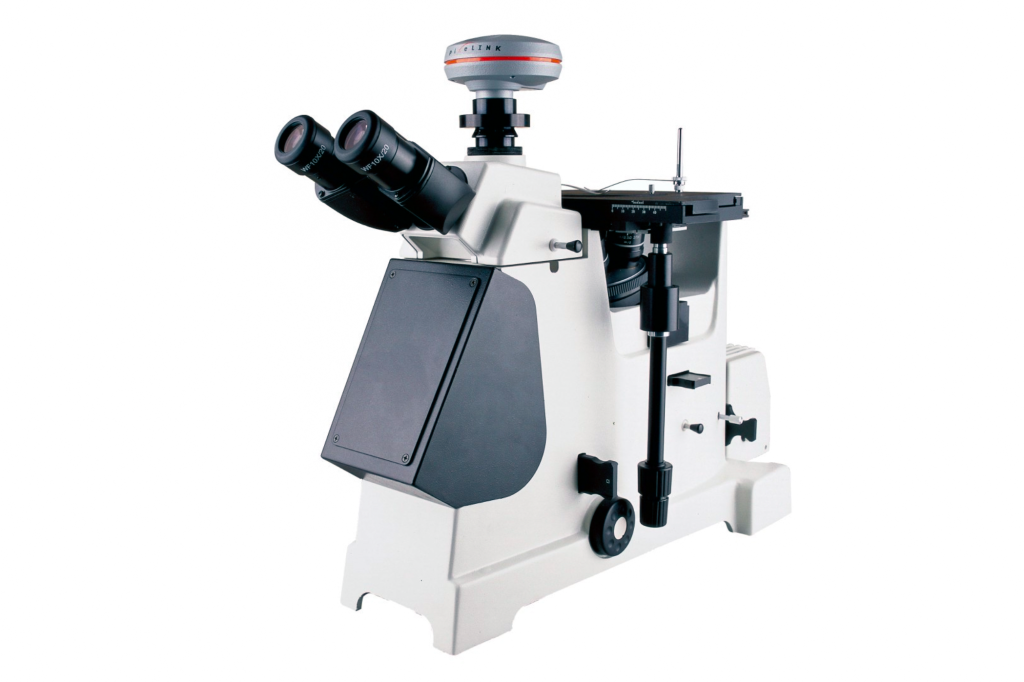Ⅰ Introduction to Metallographic Microscopes
Metallographic microscopes are a type of optical microscope that utilizes reflected light. They differ from typical biological microscopes in their principle of operation, using vertical illumination where light is directed through a beam splitter into the microscope tube below the eyepiece. These microscopes are used for high-magnification observation of opaque objects, primarily in metallurgy and other materials that do not transmit light.
Ⅱ Two types of Metallographic Microscopes
a. Upright Metallographic Microscopes
- Positioned with the objective above the specimen, these are the most common type.
- They feature an illumination system above the stage, directing light through the objective onto the sample and then reflected into the eyepiece.
- They can be equipped with a pillar stand or a typical base stand, offering stability for observing smaller specimens or flexibility for different-sized samples.
b. Inverted Metallographic Microscopes
- With the objective beneath the specimen, they can accommodate larger samples.
- The illumination system is mounted beneath the stage, allowing light to pass through the objective, illuminate the sample, and reflect into the eyepiece.
- They excel in observing larger samples that are not visible with upright microscopes, making them ideal for various engineering and manufacturing applications, such as studying fractures or corrosion.
Ⅲ Four Advantages of Metallographic Microscopes
- They integrate multiple technologies for observing metal surfaces and structures after heat treatment, combining optical microscopy, photoelectric conversion, and computer image processing.
- Compact design with aesthetic appeal, facilitating convenient use and providing clear imaging and a wide field of view, meeting ergonomic standards for prolonged operation.
- Well-designed with a large base area for stability and low center of gravity, ensuring steady placement during use.
- They are used for identifying and studying the structure of various metals, alloys, and non-metallic materials, including surface conditions of integrated circuits and micro-particles.
Ⅳ Performance of METAM LV Metallographic Microscope

Material microscopy experts seek the finest optical tools for material research, quality control, failure analysis, and other challenging applications. Inverted metallographic microscopes like METAM LV deliver optimal optical performance for analyzing microstructures, measuring particles, and addressing complex applications.
Ⅴ Technical Specifications of METAM LV Metallographic Microscope
| Optical system | Infinity optical system |
| Extra wide field of view eyepieces | WF10X/20 |
| WF10X/20, cross reticle eyepiece | |
| WF15X/16 | |
| WF20X/12 | |
| Infinity Plan Apochromatic Objective | 5X/0.17/∞/0 (BF/DF) WD 8.6mm |
| 10X/0.28/∞/0 (BF/DF) WD 3.4mm | |
| 20X/0.5/∞/0(BF/DF) WD 1.1mm | |
| 50X/0.85/∞/0(BF/DF) WD 0.5mm | |
| 100X/0.95(Dry)/∞/0(BF) WD 0.1mm | |
| 100X/1.32(Oil)/∞/0(BF) WD 0.1mm | |
| Observation head | Hinged trinocular observation head, 30° tilt |
| Kohler Lighting | 12V/100W halogen lamp, center and brightness continuously adjustable |
| Polarizer, analyzer | |
| Differential interference DIC | |
| Green, blue, yellow, gray color filters and frosted glass | |
| Focusing system | Coarse and fine movement coaxial focusing, fine adjustment grid value 2μm, coarse movement tension adjustment, movement range 1mm upward, 12mm downward |
| converter | five hole converter |
| Stage | Rectangular double-layer movable platform 200X190mm, moving range 40mmX40mm |
| Small platform: Φ16, Φ40, water drop shape | |
| Appendix | Photography and video accessories |
| Objective micrometer 0.01mm |